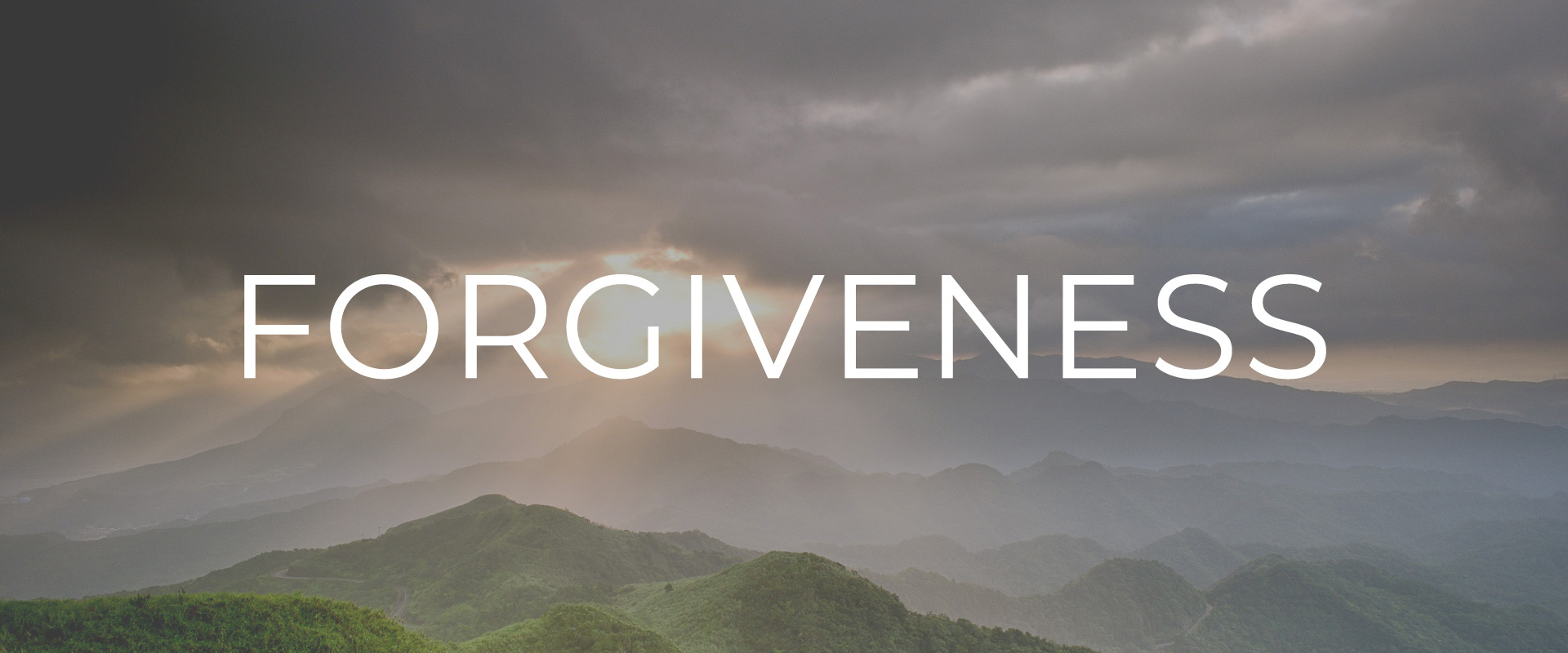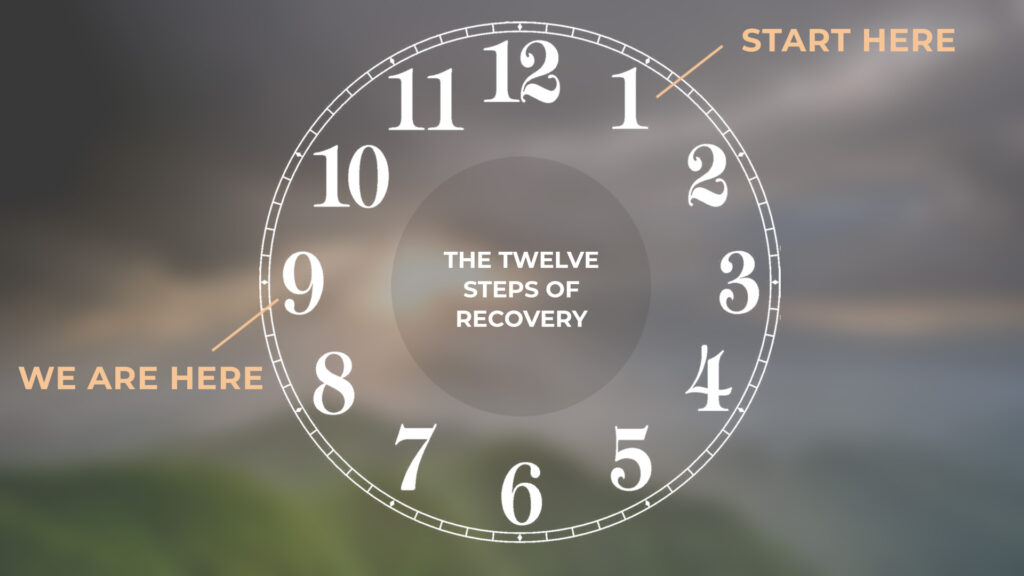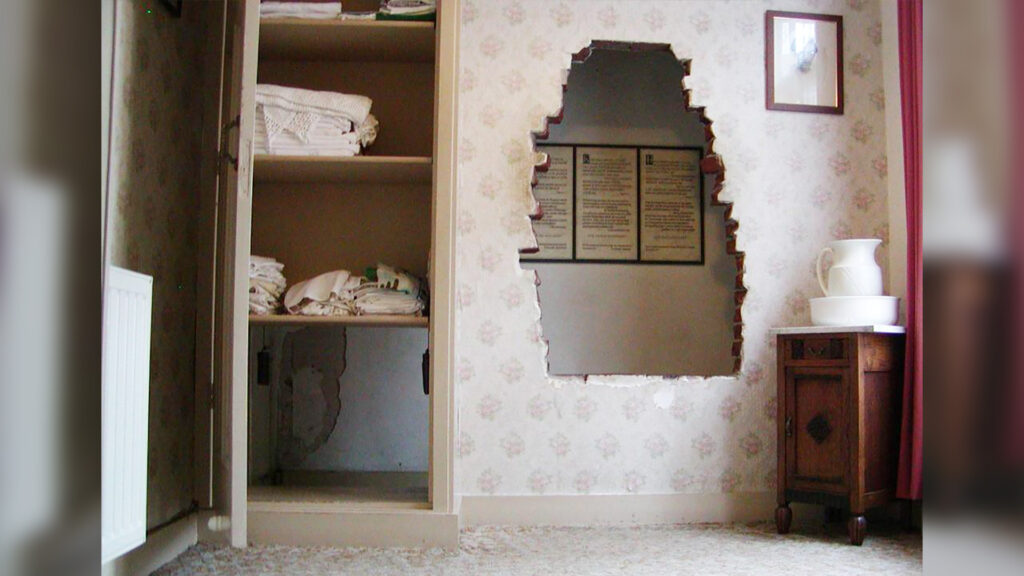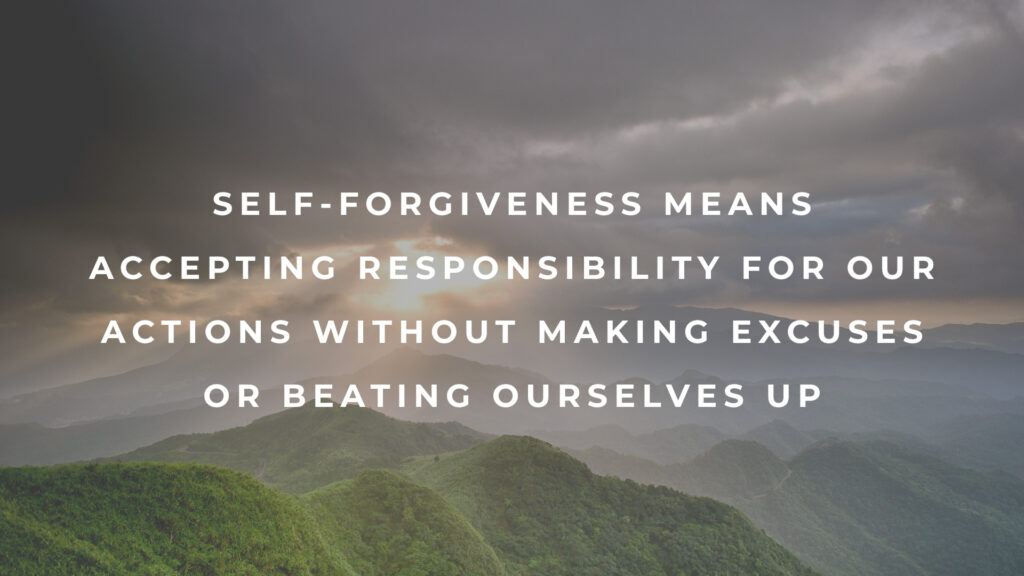
On Forgiveness
This is a Celebrate Recovery lesson I taught at Church of the City Spring Hill on October 27th, 2020. It’s a teaching about the role forgiveness plays in our recovery and it covers Principle 6 (of Celebrate Recovery’s 8 Principles) and Step 9 (of Celebrate Recovery’s 12 Steps):
- Principle 6: Evaluate all my relationships. Offer forgiveness to those who have hurt me and make amends for harm I’ve done to others, except when to do so would harm them or others.
- “Happy are the merciful.” (Matthew 5:6) “Happy are the peacemakers.” (Matthew 5:9)
- Step 9: We made direct amends to such people whenever possible, except when to do so would injure them or others.
- “Therefore, if you are offering your gift at the altar and there remember that your brother or sister has something against you, leave your gift there in front of the altar. First, go and be reconciled to them; then come and offer your gift.” (Matt 5:23-24)
You Are Here
It’s important to note where the process of forgiveness comes in the overall recovery process. We don’t start our recovery by going around forgiving everybody! We first need to work through 8 other steps before we’re ready for this one.

On Forgiveness
I think we all agree that forgiveness is a beautiful idea. Until it’s our turn to forgive someone! Then it gets tough. But forgiveness is not something that those of us in recovery can take lightly. Why? Because no matter how great the offense or abuse we are facing, the path to healing requires forgiveness. In fact, forgiveness is God’s prescription for the broken. Facing our past and forgiving ourselves and those who have hurt us is the only lasting solution. We all know that one of the roots of compulsive behavior is buried pain. Forgiveness heals that pain and breaks the cycle. It doesn’t settle all the questions of blame, justice, or fairness, but it does allow us to heal.
There’s a story from Spain in the 1930’s about a father and son who had become estranged. The son ran away, and after a while the father set off to find him. He searched the city for week to no avail. Finally, in a last desperate effort to find him, the father put an ad in a Madrid newspaper. The ad read: “Dear Mateo, Meet me in front of this newspaper office at noon on Saturday. All is forgiven. I love you. Signed, Your Father.” That Saturday at noon, nearly 400 men named Mateo showed up, looking for forgiveness and love from their fathers. Forgiveness is a powerful thing! And our need for it is universal. The famous psychiatrist Karl Menninger once said that if he could fully convince the patients in psychiatric hospitals that their sins were forgiven, 75 percent of them could walk out the next day.
Three Kinds of Forgiveness
In order to be completely free from our resentments, anger, shame, and guilt, we need to give and accept forgiveness in all areas of our lives. If we don’t, our recovery inevitably stalls out. So in this lesson, we’re going to look at three kinds of forgiveness in the form of three questions.
1. Have you accepted God’s forgiveness?
This is a big deal. No matter what our hurt, habit, or hang up is, we’ve all been wounded, or betrayed, or wronged. But we’re also painfully aware of how we have wounded, or betrayed, or wronged other people. There is a burden of shame and guilt that comes with knowing that we have hurt other people. We’ve all done and said and thought things we shouldn’t have. The Creator of the universe knows what we’ve done. And you know what? He loves us anyway, and He is ready to forgive us.
If we confess our sins, he is faithful and just to forgive us our sins and to cleanse us from all unrighteousness.
1 John 1:9
There is therefore now no condemnation for those who are in Christ Jesus.”
Romans 8:1
When we put our faith in Jesus, when we trust Him with our lives, when we confess our sins to Him, we are forgiven. So the question we need to ask ourselves if this: Have I accepted God’s forgiveness?
Have you forgiven others who have hurt you?
We all know this kind of forgiveness doesn’t just happen in a flash. It’s a process. As we say in recovery, we need to be willing to be willing to let go of the pain of the past harm and abuse caused by others. Allow me to share some profound thoughts about forgiveness from one of my favorite thinkers, C.S. Lewis:
. . . you must make every effort to kill every taste of resentment in your own heart—every wish to humiliate or hurt or to pay out the person who hurt you. The difference between this situation and the one in which you are asking God’s forgiveness is this. In our own case, we accept excuses too easily; in other people’s we do not accept them easily enough.
As regards my own sin it is a safe bet… that my excuses are not really so good as I think; as regards other men’s sins against me it is a safe bet…that their excuses are better than I think….But even if he is absolutely fully to blame we still have to forgive him; and even if 99% of his apparent guilt can be explained away by really good excuses, the problem of forgiveness begins with the 1% guilt which is left over. To excuse based good excuses is not Christian character; it is only fairness. To be a Christian means to forgive the inexcusable, because God has forgiven the inexcusable in us.
This is hard. It is perhaps not so hard to forgive a single great injury. But to forgive the incessant provocations of daily life—to keep on forgiving the bossy mother-in-law, the bullying husband, the nagging wife, the selfish daughter, the deceitful son—how can we do it? Only, I think, by remembering where we stand, by meaning our words when we say in our prayers each night ‘forgive our trespasses as we forgive those that trespass against us.’ We are offered forgiveness on no other terms. To refuse it is to refuse God’s mercy for ourselves.
C. S. Lewis from his book The Weight of Glory
Lewis is right about that. Jesus himself said,
For if you forgive other people when they sin against you, your heavenly Father will also forgive you. But if you do not forgive others their sins, your Father will not forgive your sins.
Matthew 6:14-15
It might seem like a harsh teaching, but God knows what we need and He wants what’s best for us, and that is to walk in forgiveness.
If you have been the victim of sexual abuse, physical abuse, or childhood emotional abuse, I get it. I am all too aware of the deep and long-term damage that abuse can cause. If that’s you, then you need to know that forgiveness is your way out. You will not find freedom from your perpetrators until you’re able to forgive them. That said, remember that forgiving them in no way excuses them for the harm they caused you! What forgiveness does is release you from the power they have had over you.
Corrie Ten Boom
Corrie ten Boom, she was a Dutch woman, a Christian, who, along with her father and other family members, helped hundreds of Jews escape the Nazi Holocaust during World War II. They built a hidden room in their house in Amsterdam where Jews could hide. Here’s a picture of it:

This was Corrie’s bedroom on the top floor of the house. They created a hidden room by building this false wall, which obviously didn’t have that big hole in it at the time. To enter the secret room, the Jews had to crawl on their hands and knees under the bottom shelf of the linen closet. Then Corrie would close a sliding panel, put the linen back on the shelf, and pray. The hidden room was only 30 inches deep, but as many as six people at a time would hide there while the Nazi soldiers raided the Ten Boom house, which was often. Corrie was eventually imprisoned for her actions, and her sister was killed in a death camp.
Corrie later told of not being able to forget a wrong that had been done to her by a Nazi sympathizer. She had forgiven the person, but she kept rehashing the incident to the point where she couldn’t sleep. Finally, she cried out to God for help in putting the problem to rest. Here’s what she wrote:
His help came in the form of a kindly Lutheran pastor to whom I confessed my failure after two sleepless weeks.” He pointed out the window and said “Up in the church tower is a bell which is rung by pulling on a rope.”
“But you know what? After you let go of the rope, the bell keeps on swinging. First ding, then dong. Slower and slower until there’s a final soft ding and it stops.” The pastor continued. “I believe the same thing is true of forgiveness. When we forgive, we take our hand off the rope. But if we’ve been tugging at our grievances for a long time, we mustn’t be surprised if the old angry thoughts keep coming for a while. They’re just the dinging of the old bell slowing down.”
Corrie then adds. “And so it proved to be. There were a few more midnight reverberations, a couple of dings when the subject came up in my conversations, but the force—which was my willingness in the matter—had gone out of them. They came less and less often and at the last stopped altogether: we can trust God not only above our emotions but also above our thoughts.”
Corrie Ten Boom
Have you forgiven yourself?
We can accept God’s forgiveness and forgive others, but we often feel the guilt and shame of our past is just too much to forgive.
This was the case with my birth father who left me and my sister when I was five years old. Decades later we reconnected and for the last couple years of his life, we held an extended conversation via written correspondence. My dad the quiet atheist, my the budding theologian and, in a sense, the reluctant evangelist. My dad was born in Minnesota and moved to Hollywood to pursue his dream of acting. But he ended up in Tucson, Arizona, a desert city he never cared about, or talked about, or dreamed of visiting.
This is where he spent the last twenty years of his life as a recluse. He had no friends, no family, no job, no church, no social connections. He just sat in his tiny, dark studio apartment by himself doing crossword puzzles, watching TV, drinking brandy, smoking cigarettes, and waiting to die. What I learned over the course of our correspondence was the reason why he did that. He couldn’t forgive himself for what he’d done to so many people in his life. He had married and divorced four wives, created and abandoned eight children (that he knew of). He was overwhelmed by guilt and shame and, without God, he thought he had no one that could save him, or make things right. He thought there was no one he could turn to to remove his suffocating burden. So he punished himself for his sins by removing himself from society and hiding where, in his words, he wouldn’t hurt anyone else.
There’s a verse in Isaiah that describes what God wanted to do with the darkness of my dad’s past. ANd it’s what God wants to do with your past and mine, too:
Come, let’s talk this over! says the Lord; no matter how deep the stain of your sins, I can take it out and make you as clean as freshly fallen snow. Even if you are stained as red as crimson, I can make you white as wool! If you will only let me help you.
Isaiah 1:18–19 (TLB)
No matter how unloved or worthless we may feel, God loves us. Our feelings about ourselves don’t change the truth of His love for us. Think about it this way: If God Himself can forgive us, on what basis are we justified in not forgiving ourselves?
Don’t get me wrong. Self-forgiveness is not a matter of assigning the blame to someone else. It’s also not downplaying our own guilt or a license for irresponsibility. Self-forgiveness means accepting responsibility for our actions without making excuses or beating ourselves up. It is an acknowledgment that we are human and flawed, and yet we are loved by God. It’s seeing ourselves the way God sees us. And it’s critical to finding healing because it breaks the endless cycle of self-blame and allows us to make the changes needed for a sustainable recovery.

Summary
There’s a fog of guilt and shame that clouds and distorts our thinking when we are in our addictions or compulsive behaviors. As we take the necessary steps of forgiveness that fog starts lifting—we start to see situations and relationships and ourselves more clearly. By learning to give and accept forgiveness, we obviously don’t change the past. We can’t ever change the past. But we sure can change the future.
